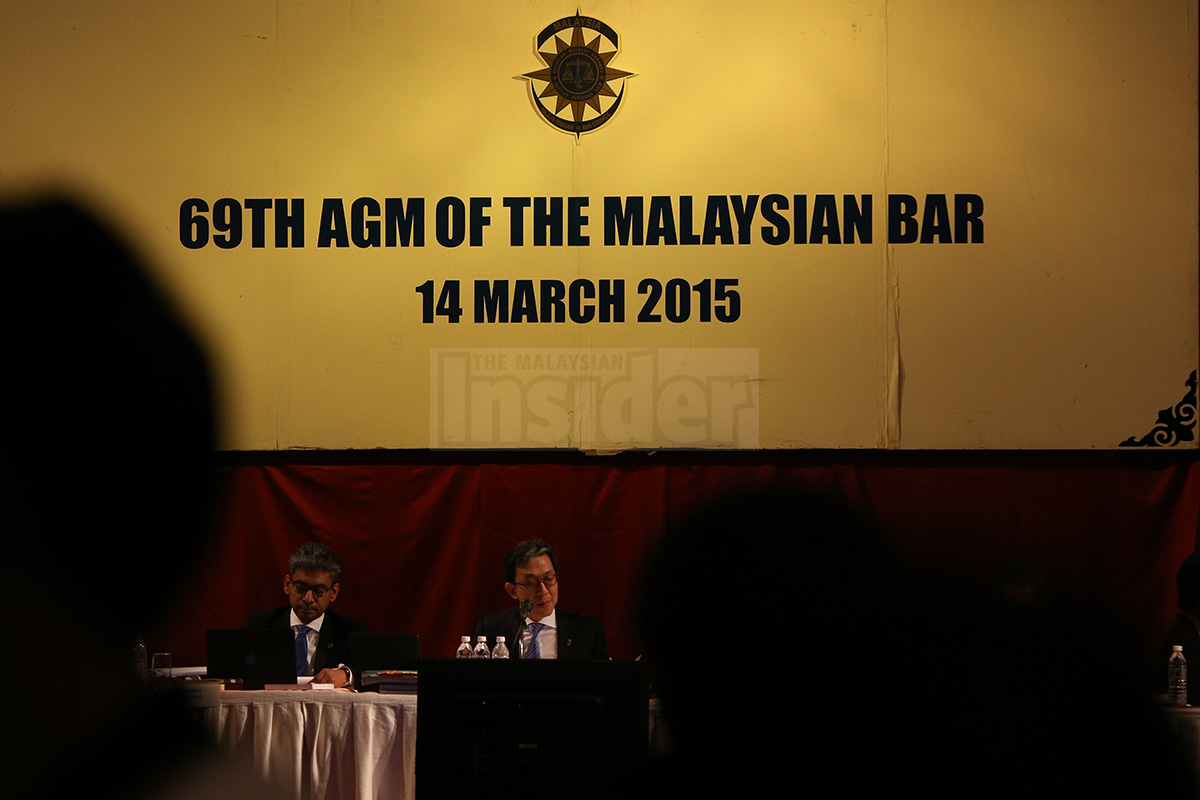
“A spectre is haunting Europe — the spectre of communism. All the powers of old Europe have entered into a holy alliance to exorcise this spectre: Pope and Tsar, Metternich and Guizot, French Radicals and German police-spies,” so say Karl Marx and Friedrich Engels in their joint pamphlet titled The Communist Manifesto first published in 1848.
So it would seem to be with respect to the Malaysian Bar as well.
Yesterday, the motion proposed by yours truly and seconded by my colleague, Aidil Khalid, both of us being among the 100 initial lawyers who put our names to our Press Statement of 21 February 2024 calling for the now former Malaysian Bar President, Mr Christopher Leong, to retract his Press Release dated 11 February 2024 titled “Dato’ Seri Anwar Ibrahim: Prosecuted or Persecuted?” was defeated by 161 votes in favour versus 1,194 votes against. The motion tabled by us was not an official initiative of the G100, but nonetheless received their support. This support was however not forthcoming from the majority of attendees of the recently concluded 69th Annual General Meeting of the Malaysian Bar (AGM).
Truth be told, we never did expect that our motion would win enough support to be passed, given the overwhelming dominance of those inclined towards the opposition coalition within and surrounding the Bar Council, and their tendency to attend in high numbers when this establishment is challenged. The very fact that G100 were labelled Barisan Nasional or UMNO lawyers by the same establishment in spite of no evidence regarding the same is in itself indicative of the polarising divide commonplace within the Malaysian Bar itself, and a direct result of neglect of the welfare of members in favour of dabbling in partisan politics throughout the years.
But while our motion was defeated, I do believe that we had succeeded in bringing notice to the Bar Council in particular and the Malaysian Bar in general that all is not well within the Bar, and that, should events continue to unfold as they do or to put it succinctly, should the business of neglect for welfare and divisive undertakings continue as usual, they can expect an even bigger uprising against them in the future.

When the communist ideology was first proposed by Marx and Engles in 1848, it was offered as a solution to the woes plaguing Europe at the time. The social and economic strata of society were divided between the haves and have nots, or in Marx and Engles’s terms, the bourgeoisie and the proletariat. The bourgeoisie consisted of the landed gentry, the merchants and the bankers who owned resources which were processed into their finished form by the proletariat in exchange for wages. These were meagre and not enough for their survival. Many could not afford to own their own dwellings, or to clothe and feed their families, while the rich gentry lived and dined in their grand lodgings. The economic and social divide was wide. Even so, the ideology proposed by Marx and Engles initially struggled to gain acceptance and support. It was not until the unmet needs of the majority proletariat were ignored for decades when finally the October 1917 revolution brought about the downfall of the Tsarist regime in Russia, and the world’s first communist government was installed in Moscow.
Likewise for Malaysia, the ruling Barisan Nasional coalition, for decades returned to power at every general election with a two-thirds majority in Parliament, arrogantly swatted away any dissent, from outside and within. This ended in 2008, when fed up voters rejected BN in five states, and in 2013, when BN’s total popular vote dipped below half of the total votes received. Today, the notion that BN will still rule Malaysia after the next general election, due in 2018, is far from certain.
From these examples there may be deduced the general principle that when injustice remains unchallenged and unfairness becomes the order of the day, then at the end of that day, a revolution emerges and results in the downfall of the old regime in favour of one that is more responsive towards the needs of the people that bore the brunt of the oppression practised by the former regime.
Bearing in mind the above principle, let us now consider the position of the Malaysian Bar and in particular, the Bar Council with respect to it. The Malaysian Bar was first set up in 1947 pursuant to the Advocates and Solicitors Ordinance 1947. It has existed for nearly 70 years, hence the conclusion of its 69th AGM recently. At the said AGM, we were reminded by so-called “senior” members of the Bar, that the Bar has a “proud tradition of upholding the cause of justice without fear or favour”. It is in the name of this fine tradition that we must not apologise when we make erroneous statements (exemplified by the rejection of our motion for the former Bar President to apologise to the Judiciary), we must reject the clear decision of the government, made in consultation with the rakyat, deciding for the retention of laws to govern the crime of sedition (exemplified by the refusal to adopt the motion concluding the national debate on the Sedition Act) and that transparency in the tabulation of ballots for elections to the Bar Council should not be encouraged (exemplified by the rejection, on the diktat issued by the Bar President, of the motion calling for greater transparency when ballots are counted for elections to the Bar).
These are among the grievances the common, ordinary lawyer must add to the increasingly long laundry list of instances of the Bar Council’s total disregard for his dignity and welfare. Among others are the attempt to force an unwanted time consuming, money costing professional development scheme onto members of the Bar, the neglect of the needs and welfare of young pupils who undergo nine months of chambering before admission to the Bar, the subjecting and conditioning the same pupils to unnecessary and bureaucratic requirements before consenting to their entry into the Bar, the charging of exorbitant fees for any talks or seminars organised by the Bar, the long delay in issuing guidelines or policy on the Limited Liability Partnership although the Act governing the same has long been introduced since 2012, a failure to speak up on ordinary issues affecting the well being of the rakyat such as high food prices and consumer rights and an unhealthy preoccupation with the welfare of a certain opposition leader.
To the above, as a result of the recently concluded AGM, we may add onto this list the excessive increase of the Building Fund to RM250 per lawyer in although the former Bar President had clearly acknowledged at the said AGM that the current economic and financial outlook for the year are far from optimal as well as a flat rejection of suggestions put forth by members in attendance that speakers engaged at events organised by the Bar Council should be given adequate monetary compensation for their trouble.
The above is but a sample of the long and continuing injustices members face with respect to an increasingly out of touch, elitist Bar Council that treats ordinary members of the Bar with what can only be described as disdain and contempt. For beneath all the fanciful words and displays of grandeur, the Bar Council masks an old, dying regime on the brink of irrelevance.
But 14 March 2024 was a watershed moment of sorts. For the first time in the Malaysian Bar history, open dissent with regards to the “official party line” was on display before the AGM. The Bar establishment for the first time was forced to take notice that not all its members would agree or go along with what has long been proscribed for them to believe. This could be discerned from utterances by the so-called senior members of phrases such as “I have not seen this in all my 20 years in the Bar”. Change, or more accurately revolution, is indeed on its way and it is feared by the establishment within the Malaysian Bar. For the average member, however, this is positive and it is to be welcomed.
Like Europe in the 1840s, a spectre of dissent now haunts the Malaysian Bar. The G100 movement, a response to Christopher Leong’s February 11 press release scandalising the Judiciary, is, in spite of all the attention generated, only the beginning. While their numbers are small now, they are set to grow and more instances of open defiance will surface if the Bar Council does not commit to mending its ways and committing fully to its statutory undertaking of upholding justice without regard to fear or favour. But how exactly should the Bar Council mend its ways? Easy. The Bar Council can and must start doing so by putting into practice actions and deeds that indicate that it is indeed pro rule of law and pro justice instead of adopting the phrase as a mere slogan. The struggle by ordinary members of the Bar for an independent body will not end until they see real, tangible results and not mere words. The Bar must cease politicking and attend immediately to the welfare of its members. In the words of one man, it is morning already, and the Bar Council must wake up and smell the coffee.
Failure to immediately do the above would be disastrous for the Malaysian Bar as a whole. While I believe that some awareness was raised with respect to this was made apparent during the recently concluded AGM, not enough is being done to avoid a split in the Malaysian Bar. Already dissenting members, fed up with the constant focus on irrelevant issues, agitate for an alternative Bar. Should the Bar Council not wish to see this materialise, it had better start cracking, or revolution will certainly sweep the Bar and push the Council into oblivion.
*Faidhur Rahman Abdul Hadi is a practising lawyer in Kuala Lumpur, a Co-Founder of Concerned Lawyers for Justice and is a member of the G100.
**First published on Merdeka-Online on 16 March 2024
